3 Things Each Enneagram Type is Avoiding
Jun 13, 2022
While human beings want to both avoid pain and gain pleasure, they will do more for one than the other. Any guesses which one is more motivating?
You got it - avoiding pain.
This series below will give you 3 clues into what "painful" situations different types of people are trying to avoid so you can better understand how to motivate (or what will demotivate) your team and the unique individuals on it. This insight can also be used to better understand your clients and customers wants and concerns.
Type Ones are striving to feel perfect while trying to avoid...
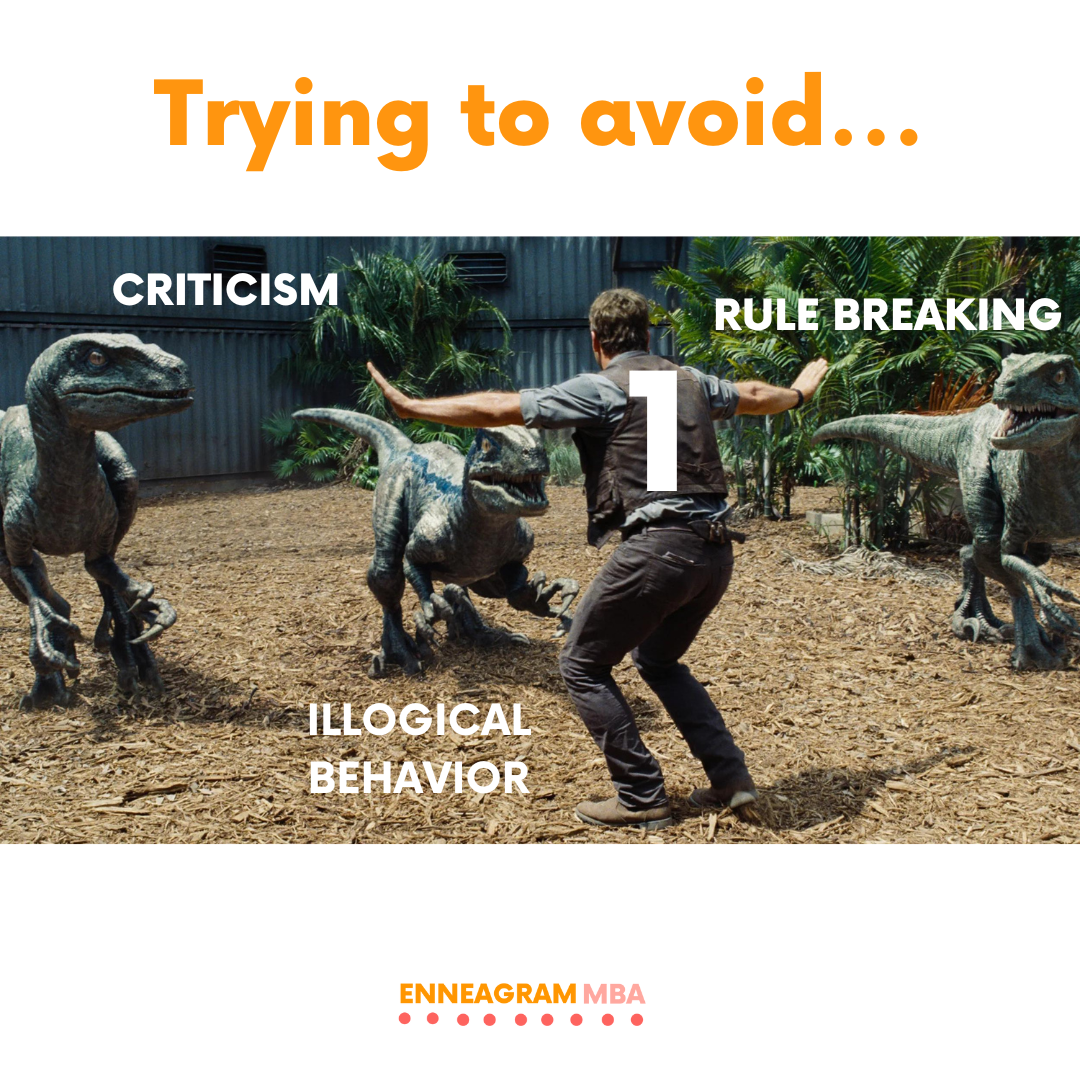
Criticism. As much as Ones are striving to be perfect, correct, and right, they’re also focused on avoiding being wrong, imperfect, or criticized in any way. Ones are already criticizing themselves constantly, so any additional outside criticism stings and is something they’re looking to avoid at almost all costs.
Criticism can also be blind spot for many Ones - as in criticizing others. Because of their own harsh inner critic, that voice can sometimes spill over into how they talk to others. What they say may be experienced as critical, even when they don’t see it that way.
An encouraging word goes a long way in helping others stay motivated or as they work to improve. The better someone with Type One energy can get at managing their own inner critic, the better they'll get at doing the same with others.
Illogical behavior. Ones are great at creating order and clarity. They can implement and enforce practical policies and needed procedures and see so clearly how to set the world straight. It can be extremely frustrating to deal with someone who doesn’t see it like they do, especially when dealing with someone who they see has impulsive or highly emotional.
Ones will have thought about and decided with certainty the right way to do something and it’s infuriating to have to repeat themselves or try to get someone onboard who wants to do it the “wrong” way.
Rule breaking. Order, systems, and processes are extremely important to the Type One. They can be extremely methodical and precise with how they get things done, careful to follow the rules to avoid making a mistake, while accomplishing the goal the "right" way. When anyone deviates from those rules or guidelines and risks the quality of the project or product, you can be sure the Type One is going to have something to say about it.
Type Twos are striving to feel connected while working to avoid…
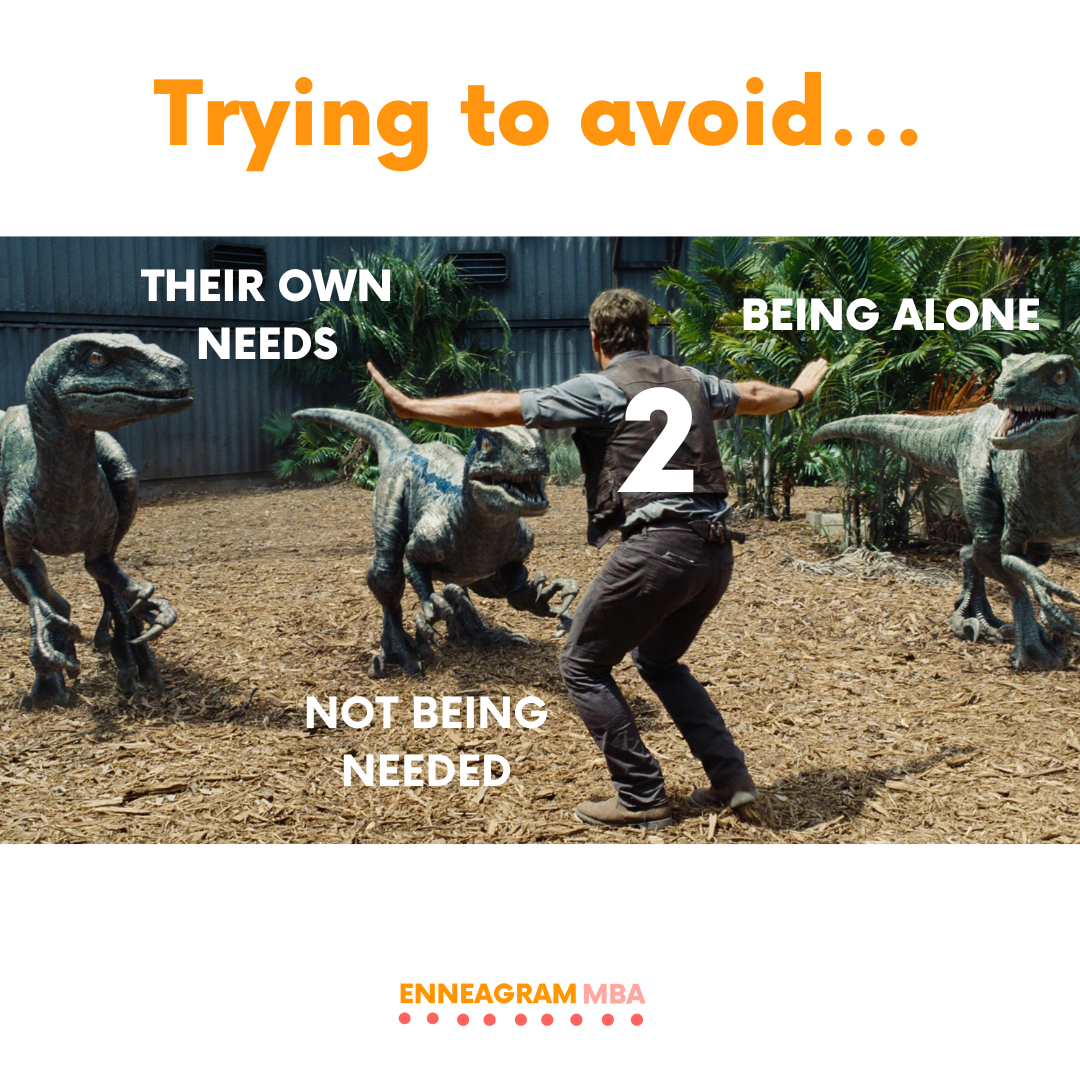
Their own needs. As a child, Two’s for whatever reason, learned that it wasn’t okay to have their own needs. From there, they developed beliefs they brought into adulthood that having their own needs is selfish and establishing healthy boundaries is unkind. Two’s believe they need to be focused on helping others, at whatever cost, in order to be worthy of love and belonging. This sense of martyr-ism is something our culture in general has encouraged women to be, but it’s especially true for the Type Two individual.
Not being needed. Their sense of self-worth comes from how helpful and generous they are. If they’re not able to give their time, support, or encouragement to others to fix problems and work through issues, the Type Two then is left wondering what value do they have?
Being alone. It’s hard to be helpful or feel connected if there’s no else around to help or connect with. Without people to give to, to love on, or to support, Two’s can feel worthless. It can be extremely scary being alone for this reason. The work of the Two is to get comfortable with solitude and get to a place where they can love, support, and give to themselves first.
Type Threes are striving to feel outstanding and working to avoid…
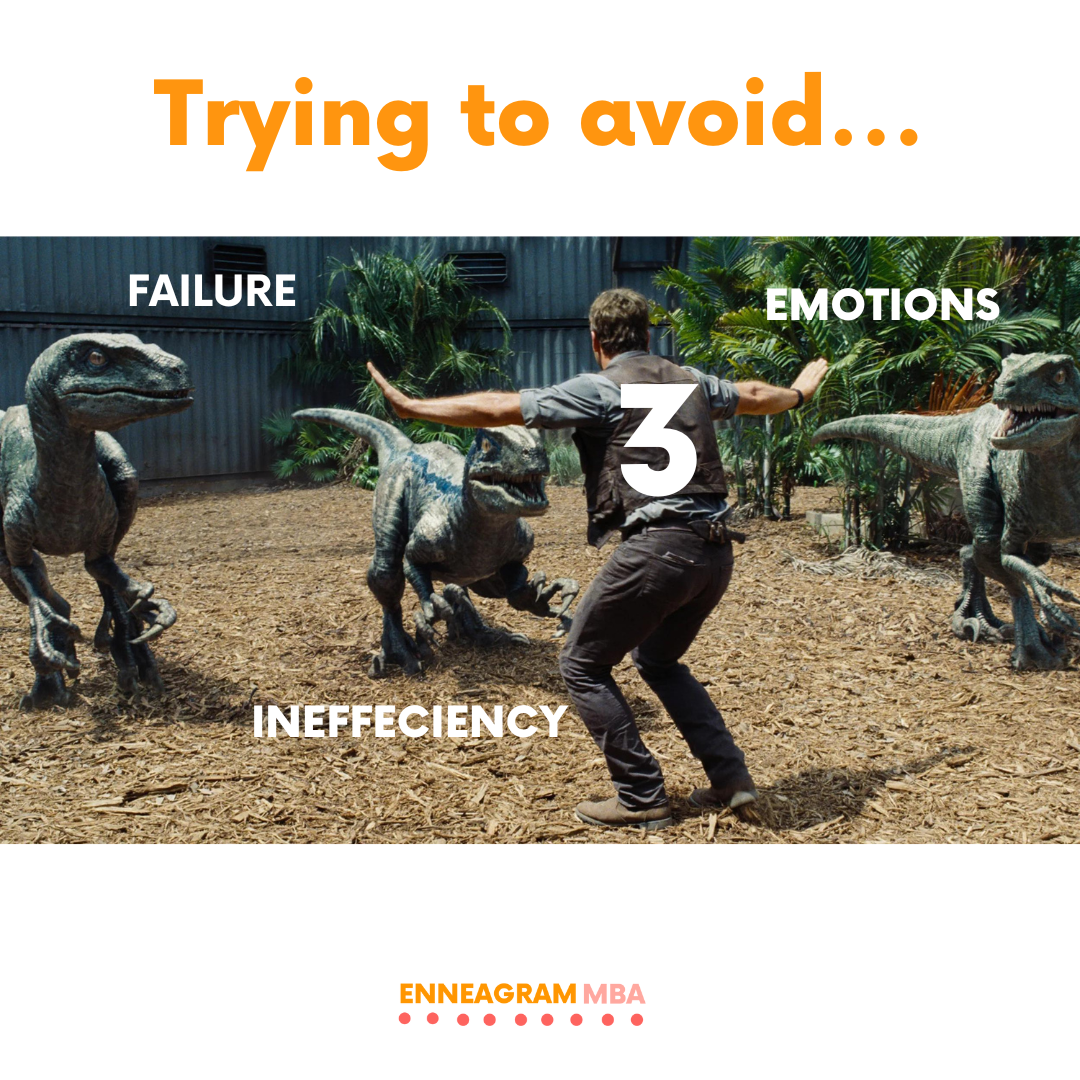
Failure. Those with the Type Three energy get their sense of worth from their success and accomplishments. No one likes to fail, but for a Type Three it can be so painful they may avoid doing anything that they don't know for certain they'll be good at.
Emotions. Even though they’re in the Feeling Center of Intelligence with the Type Twos and Fours, Threes will experience their feelings, but then quickly put them aside to get to later (which rarely happens). In the moment, they see emotions as getting in the way of reaching their goals.
Inefficiency. Along with the Type Sevens and Type Eights, Threes are in the Assertive Stance, where they’re focused on going far and fast. Anything, or anyone, that slows that process down can be very frustrating and will be something they’re looking to work around.
Type Fours are striving to feel unique while working to avoid…
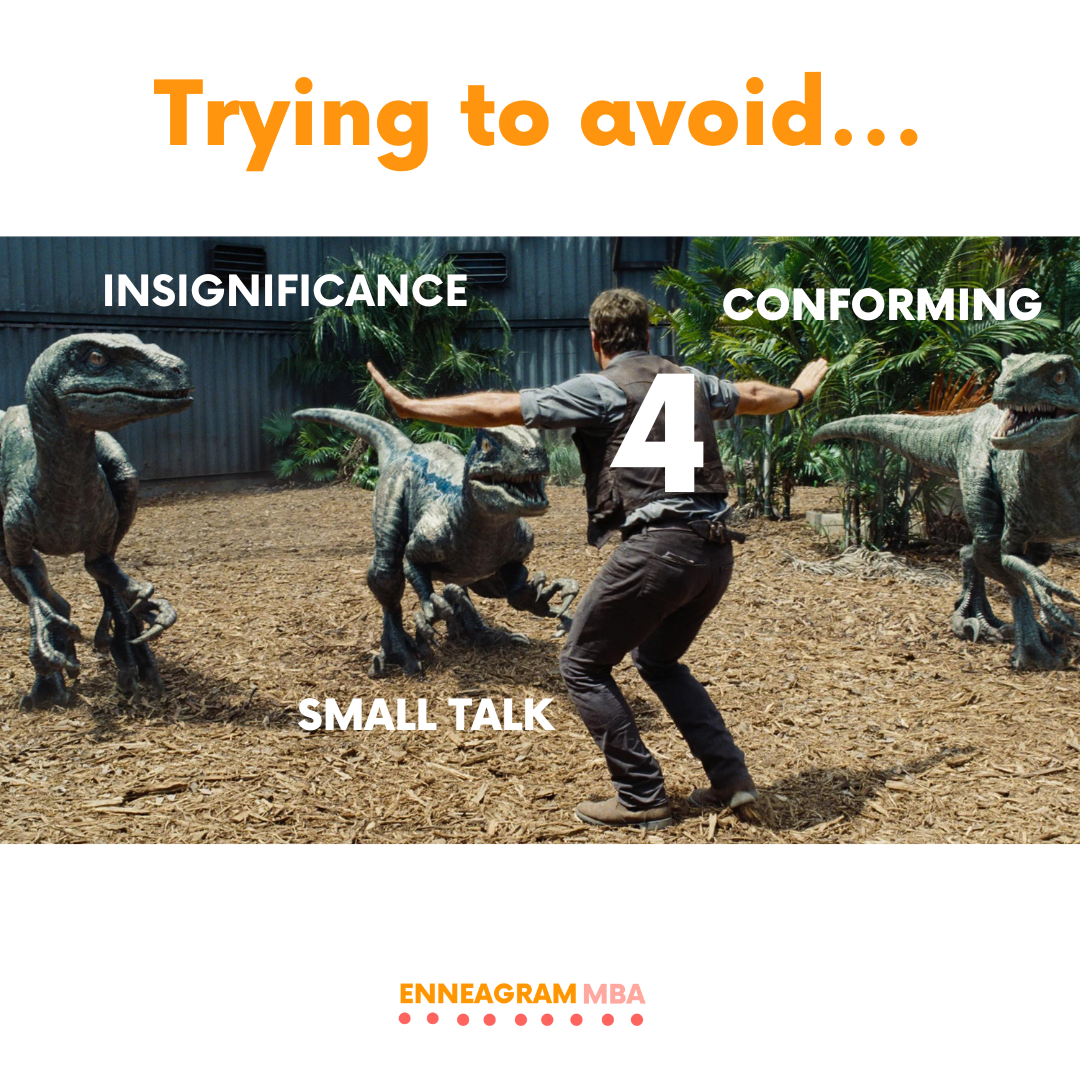
Insignificance. We all want to feel significant and that we matter, but for Fours it’s foundational. They inherently feel like something is wrong with them and that they’ll never be as good as others, so the feeling of insignificance is always just right around the corner even though they work so hard to avoid it and do all they can to be significant. In reality as you already know, we’re all already worthy and significant in our own ways.
Small talk. Fours have a deep capacity for feelings and emotions. They’re not only able to sit with uncomfortable conversations, they can find them meaningful and even enjoyable. On the other hand, small talk like the weather or surface level pleasantries can feel shallow and inauthentic and be downright painful for them to engage in.
Conforming. One of the most creative types on the Enneagram is the Type Four. Anything that feels ordinary, mundane, or traditional can cause them to run the opposite way. The bright side of this energy is that new ideas and different ways of doing things are brought to life, but the shadow side of it can be being different just for the sake of being different.
Type Fives are striving to feel self-sufficient while working to avoid
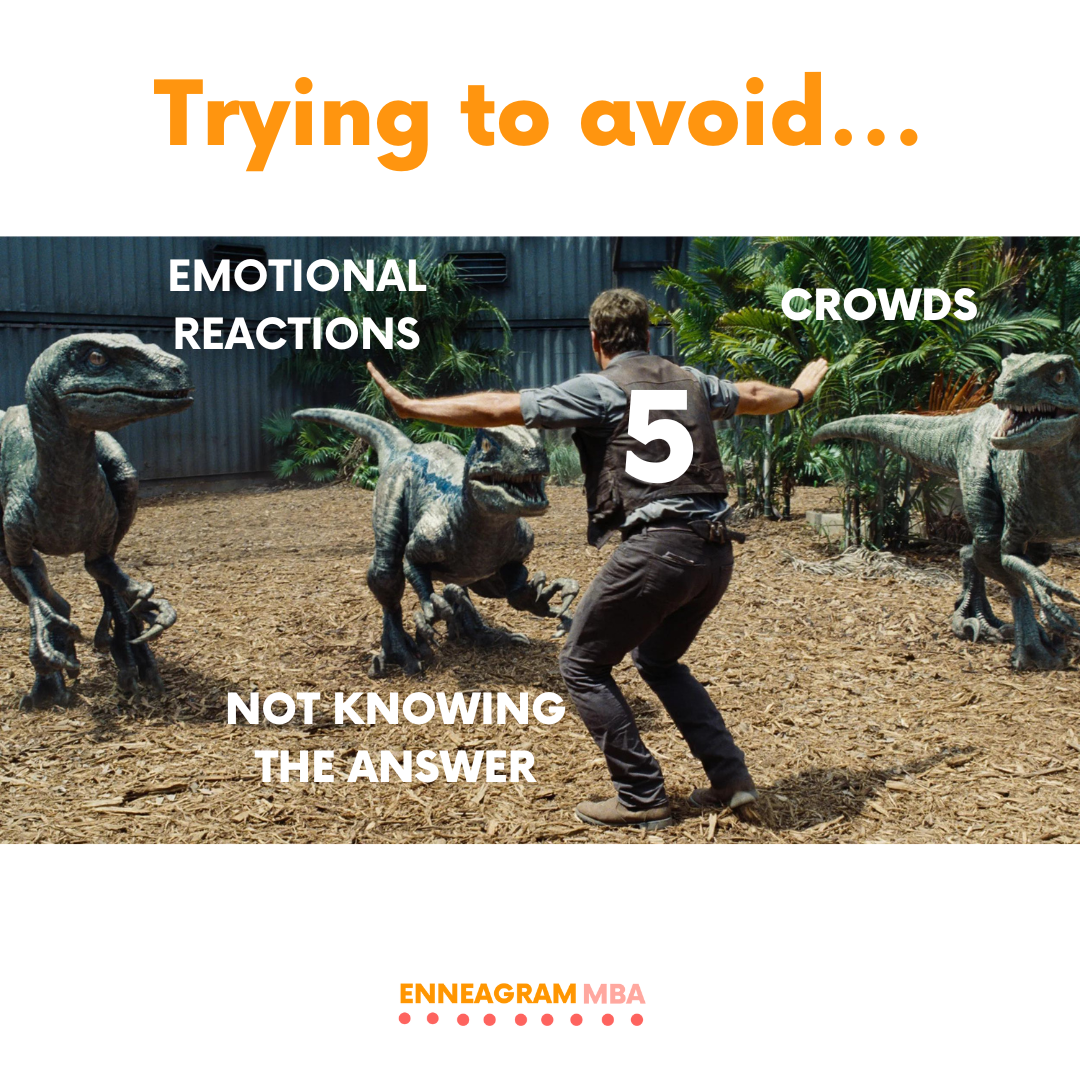
Emotional reactions. With the Type Ones and Type Threes, Fives are in the Competency Group when it comes to handling challenges and conflict. Instead of getting caught up in emotions - worry, sadness, anger, etc. - they focus on solving the problem. Their motto during these times is “show me the data, don’t give me the drama.”
Fives are also very focused on managing their energy, so someone who is highly emotional can feel draining.
Not knowing the answer. To help support their core driver of being self-sufficient, capable, and competent, Fives pride themselves on being knowledgeable and informed. They have a thirst for knowledge that at times can cross the line of being enjoyable into the territory of how they define their worth. If they don’t know the answer or aren’t sure how to figure out a problem, then they may question what value they can bring.
Crowds. Despite having a reputation for being introverted, there are absolutely extroverted Fives out in the world. One of the distinguishing qualities of a the Type Five energy though is their ability to manage their energy. Being around a lot of people at once and trying to think of what to say next can be exhausting. Most people who identify as a Type Five have a preference for being left alone to their thoughts, reading, research, and tinkering.
Type Sixes are striving to feel secure while working to avoid…

Being told what to do. Sixes have an interesting relationship with authority. On one hand, they are extremely skeptical of anyone in charge, gauging their intentions, and playing Devil’s Advocate to their ideas and opinions. On the other hand, as a type in the Dutiful Stance, they are also looking outside of themselves - whether it be an authority figure, a set of rules, guidelines, a community, etc - to measure up to and check to see how they’re doing. They sometimes just want someone to tell them what to do, while at the same time don’t want anyone to ever tell them what to do.
Self-doubt. A distinguishing characteristic of a Type Six is their inner committee. Type One has a harsh inner critic. Type Six has a multi-voiced committee with differing opinions, all kinds of ideas, and various questions of what could go wrong. Because of this, trusting themselves to know which “voice” to listen to can be hard.
Every single person can struggle with self-doubt, but for Sixes they somehow picked up as a child that it’s not okay to trust themselves. They’ve carried that belief into adulthood and now look to find that safety net and support system to help them be able to trust themselves.
Not being prepared. Sometimes Sixes are called the Devil’s Advocate or the Skeptic. Bringing up all the things that could go wrong with an idea or project isn’t negative for them - they care deeply about the people in their circles and by bringing up what all could go wrong they feel like they can prepare a contingency plan and be ready to protect others and themselves against what might go wrong. Because they spend so much time thinking of all the things that could go wrong, when someone does happen they didn’t think about they can be extra hard on themselves because they “should have thought of that.”
Type Sevens are striving to feel satisfied while working to avoid…

Negative Emotions. Sevens are known as the eternal optimists of the Enneagram. They have a superpower of reframing any situation into a positive one. Sometimes this can lead to toxic positivity because they only allow themselves and others to feel one kind of emotions - happy, positive ones. Their motto would be #goodvibesonly. Negative feelings can feel so scary because Sevens are afraid that if they allow themselves to feel that side, then they’ll get stuck there forever.
Lack of options. Sevens are working to experience all that life has to offer. Their “deadly sin” is gluttony - and it’s not necessarily for food, or even material things. It’s typically this deep, and at times desperate pursuit to have as many experiences as they possibly can while they're here and anything keeping them from having the option to do just that can feel heavy and something to avoid at all costs.
Rules. Unlike the Type One, Seves are okay with, and even enjoy breaking the rules. They view rules, hierarchy, and structure as limiting to their options and freedom. Most of the time Sevens won’t outright rebel against them, but do so with “soft” rebellion. For example, they’ll make friends with their boss to level the hierarchy and avoid being strictly held to the rules.
Type Eights are striving to feel powerful while working to avoid…

Indirectness. Eights can’t stand beating around the bush. They not only don’t have time for it, but trust and honesty are incredibly important, so they want to know where people stand. They don't want to be left trying to guess, or worse, being lied to, about where that person stands. Eights have the ability to be direct and clear and they appreciate the same in others. Even if they don’t always agree with what’s said, they respect the decisiveness.
Waiting. Along with the Threes and Sevens, Eights are in the Assertive Stance where they’re focused on going far, and getting their fast. They have the greatest energy of all types on the Enneagram and with the smallest amount of patience. Waiting for the “right” time, permission, or for someone to make up their mind usually isn’t going to happen for those with the Type Eight energy. They’re going to dive in, head first, and figure it out along the way. "Just do it" would be their life motto.
Being controlled. They typically prefer to be the boss and in charge, but that may not be possible in every situation, so they’re okay with someone else leading as long as they see them as competent and capable. And as long as they don’t try and control them. Autonomy is foundational for Type Eights who value power and control, so anything that could infringe on that independence is going to be what they’re looking to avoid.
Type Nines are striving to feel at peace while working to avoid…
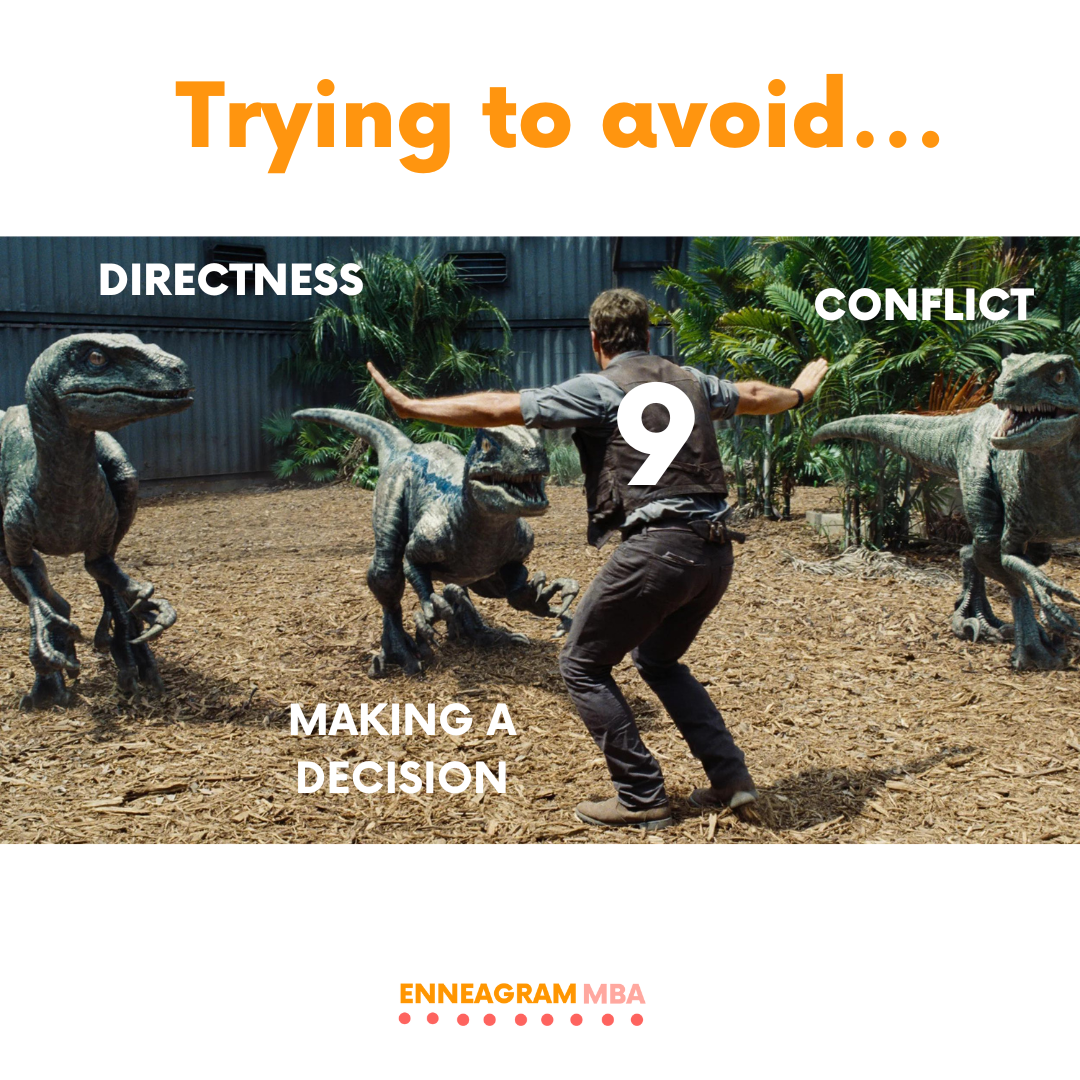
Directness. Almost the exact opposite of the Type Eight energy, Type Nines prefer more subtleness, politeness, and political correctness. They don’t care for the hard and fast directness that could lead to conflict or hurt feelings. Instead they’re focused on ensuring everyone has an opportunity to share their thoughts and feel heard.
Making a decision. This can be touch for Type Nines for two reasons. One, when a decision is made not everyone is going to agree, which could cause conflict and disrupt the peace, something the Type Nine is avoiding like the plague (see the next point). The second reason is because Nines have an ability to live in the gray and see all perspectives, so they can truly struggle drawing a line in the sand with a definitive answer or opinion because there’s pros to the alternatives too.
Conflict. At the end of the day, Nines want to belong to the groups they care so much about being a part of - family, their friends circle, their team at work. They fear conflict not so much for the conflict itself, but what that conflict could bring - getting bumped from the group and feeling disconnected from their people. To avoid this happening, even when they have a strong opinion about something or feel confident in being more direct, they will tend to think twice about how that response could impact those relationships.
Was this helpful in narrowing down your dominant Enneagram type or helpful in better understanding someone around you? If you already know your Enneagram Type, what would you add to your list of things you're working to avoid? Say hi and let me know at [email protected]!
Looking to strengthen your team’s dynamics and boost collaboration? Book a team-building Enneagram workshop with Enneagram MBA and discover how understanding personality types can transform your workplace relationships and elevate your team’s performance!
